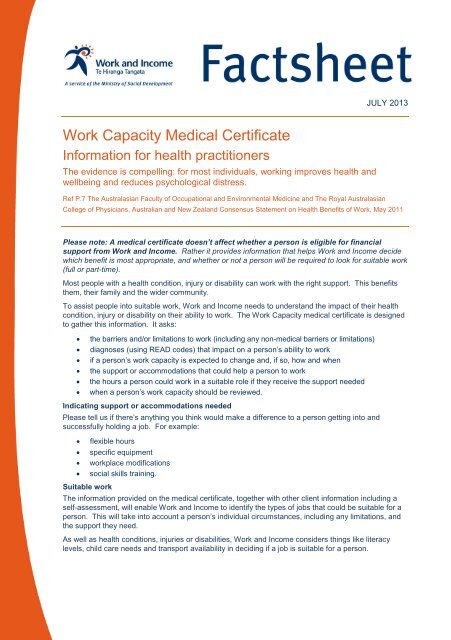Work Capacity Medical Certificate information sheet
Work Capacity Medical Certificate information sheet
Work Capacity Medical Certificate information sheet
- No tags were found...
Create successful ePaper yourself
Turn your PDF publications into a flip-book with our unique Google optimized e-Paper software.
JULY 2013<strong>Work</strong> <strong>Capacity</strong> <strong>Medical</strong> <strong>Certificate</strong>Information for health practitionersThe evidence is compelling: for most individuals, working improves health andwellbeing and reduces psychological distress.Ref P.7 The Australasian Faculty of Occupational and Environmental Medicine and The Royal AustralasianCollege of Physicians, Australian and New Zealand Consensus Statement on Health Benefits of <strong>Work</strong>, May 2011Please note: A medical certificate doesn’t affect whether a person is eligible for financialsupport from <strong>Work</strong> and Income. Rather it provides <strong>information</strong> that helps <strong>Work</strong> and Income decidewhich benefit is most appropriate, and whether or not a person will be required to look for suitable work(full or part-time).Most people with a health condition, injury or disability can work with the right support. This benefitsthem, their family and the wider community.To assist people into suitable work, <strong>Work</strong> and Income needs to understand the impact of their healthcondition, injury or disability on their ability to work. The <strong>Work</strong> <strong>Capacity</strong> medical certificate is designedto gather this <strong>information</strong>. It asks:• the barriers and/or limitations to work (including any non-medical barriers or limitations)• diagnoses (using READ codes) that impact on a person’s ability to work• if a person’s work capacity is expected to change and, if so, how and when• the support or accommodations that could help a person to work• the hours a person could work in a suitable role if they receive the support needed• when a person’s work capacity should be reviewed.Indicating support or accommodations neededPlease tell us if there’s anything you think would make a difference to a person getting into andsuccessfully holding a job. For example:• flexible hours• specific equipment• workplace modifications• social skills training.Suitable workThe <strong>information</strong> provided on the medical certificate, together with other client <strong>information</strong> including aself-assessment, will enable <strong>Work</strong> and Income to identify the types of jobs that could be suitable for aperson. This will take into account a person’s individual circumstances, including any limitations, andthe support they need.As well as health conditions, injuries or disabilities, <strong>Work</strong> and Income considers things like literacylevels, child care needs and transport availability in deciding if a job is suitable for a person.
How often does a person need to give <strong>Work</strong> and Income a medical certificate?The medical certificate allows you to indicate an appropriate review period based on your clinicalassessment.The legislative requirements for the Jobseeker Support benefit mean that medical certificates cancover a maximum of four weeks for the first eight weeks, and then up to a maximum of 13 weekssubsequently.There are exceptions for:• people who have a job to return to (initial medical certificate may cover up to 13 weeks)• women who are more than 27 weeks pregnant (medical certificate may extend to four weeksafter due date).People for whom the impact of their condition on their ability to work is long-term and severe are likelyto get the Supported Living Payment benefit. The review period for this group is two or five years, ornever.Completing a <strong>Work</strong> <strong>Capacity</strong> medical certificateYou must be sure the <strong>information</strong> you’re providing is professional, true and accurate. It would beprudent to keep a copy of the certificate.The medical certificate can be completed through practice management systems. Alternatively, padsof hard copy forms are available from your <strong>Work</strong> and Income Health and Disability team.The certificate can be completed by a:• registered medical practitioner• nurse practitioner (not practice nurse) for Jobseeker Support clients only• midwife where a person is more than 27 weeks pregnant or has complications due to theirpregnancy• dentist (for dental-related conditions).Health practitioners not listed above, such as chiropractors and psychologists, can’t complete a <strong>Work</strong><strong>Capacity</strong> medical certificate.When the form is completed please hand it to the person so they can take it to their local <strong>Work</strong> andIncome office.How <strong>Work</strong> and Income uses the <strong>information</strong> on the medical certificateWhere appropriate, <strong>Work</strong> and Income will ask the person to complete a self-assessment so we canlearn more about their skills, the type of work they’d like to do and what they believe their barriers towork are.The medical certificate and other relevant <strong>information</strong> will be used to help decide the type of benefit aperson gets and if a person should have work obligations (be required to look for suitable full or parttimework).For people with work obligations, the case manager will develop a plan with the person and work withthem to put it into action. Some people may be supported by third-party organisations contracted by<strong>Work</strong> and Income.People on the Supported Living Payment benefit are not expected to look for work, but if a personwishes to work, they can complete a self-assessment and develop a plan with a case manager.• Contact the Health and Disability Team at your nearest <strong>Work</strong> and Income Regional Office• Visit www.workandincome.govt.nz• Call us on 0800 559 009JOBS118W-JUL2013
















